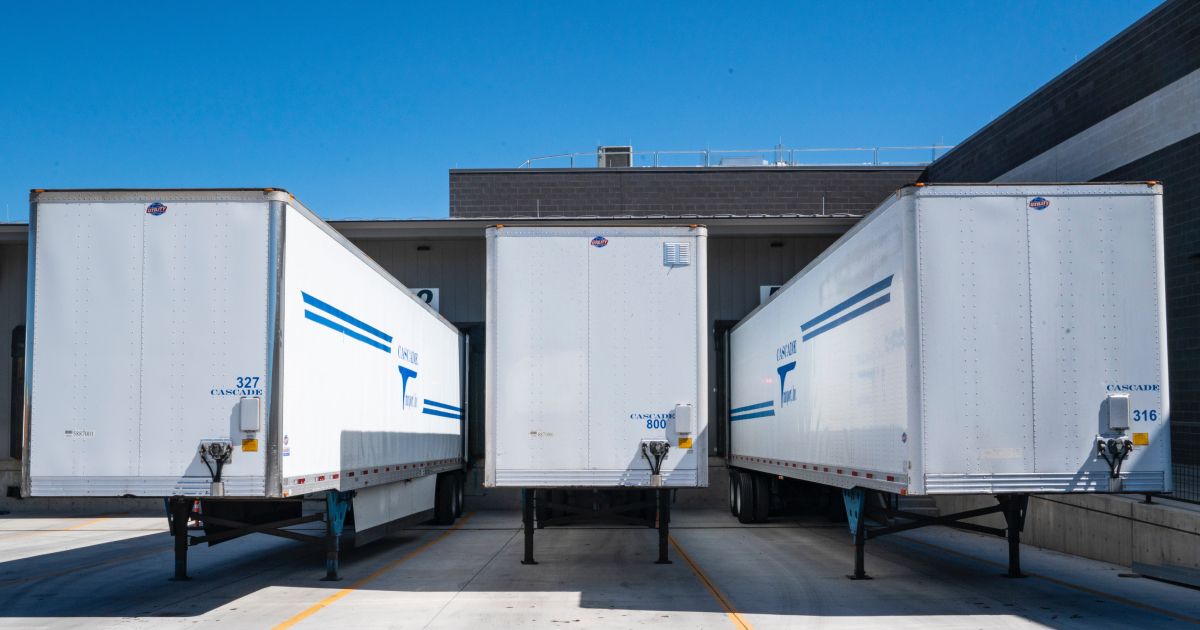6 Reasons Why Logistics Management is Essential

In today's fast-paced global economy, the efficient movement of goods and services has become a cornerstone of success for businesses of all sizes and industries. This critical aspect of operations is known as logistics. Logistics management encompasses a complex set of processes that involves the planning, implementation, and management of the flow of goods, information, and resources from point of origin to point of consumption.
In this article, we will explore why logistics management is essential for companies striving to thrive in the competitive landscape of the 21st century.
1) Cost Efficiency

Logistics management stands as a linchpin in the pursuit of cost efficiency within the business world. Its pivotal role lies in its capacity to curtail operational expenses by strategically minimizing transportation costs, reducing the financial burden of holding inventory, and simplifying complex processes. Through efficient logistics, companies can achieve a smoother supply chain management system, securing access to raw materials at competitive prices. Moreover, they can minimize wastage and optimize resource allocation, leading to a more sustainable and profitable operation. Ultimately, these cost-efficiency gains allow businesses to offer competitive prices to their customers while simultaneously safeguarding healthy profit margins, reinforcing the crucial role of logistics in sustaining economic viability.
In a globalized and fiercely competitive market, efficient logistics serves as a key driver of a company's competitiveness. By systematically fine-tuning supply chain processes and optimizing logistics strategies, businesses can gain a significant edge over their rivals. With the ability to swiftly adapt to market fluctuations and disruptions, companies that excel in logistics can respond to customer demands more effectively and efficiently. In essence, logistics management is not just about managing the flow of goods but also about staying ahead in a dynamic marketplace where adaptability and competitiveness are the hallmarks of success.
2) Customer Satisfaction

In the contemporary, customer-centric marketplace, the bedrock of maintaining high customer satisfaction lies in the consistent and dependable delivery of products and services. Here, logistics emerges as the unsung hero, playing a pivotal role in ensuring that products reach consumers punctually and in pristine condition. The ramifications of tardy deliveries, damaged goods, or stockouts can be far-reaching, often resulting in disgruntled customers who are inclined to explore alternatives offered by competitors. It's in this context that the significance of an efficient logistics system comes to the fore. Beyond ensuring timely deliveries, such systems facilitate accurate order tracking, enriching the overall customer experience. In essence, logistics becomes not just a behind-the-scenes operation but a vital customer touchpoint that can either enhance or erode brand loyalty.
With e-commerce and fast-paced consumer expectations dominating the market, the importance of logistics in safeguarding customer satisfaction has never been more pronounced. Today's consumers not only expect products to be delivered swiftly but also desire real-time visibility into the status of their orders. An efficient logistics system that provides accurate tracking information empowers customers, reducing anxiety and enhancing trust in the brand. Moreover, it can also lead to repeat business and positive word-of-mouth referrals, underscoring the instrumental role logistics plays in the customer-centric paradigm of modern commerce. In summary, in a world where customer satisfaction is paramount, logistics is the linchpin that can make or break a company's reputation and success.
3) Competitive Advantage

In the fiercely competitive landscape of today's globalized marketplace, logistics management emerges as a formidable source of competitive advantage. The ability to swiftly respond to evolving market demands, deftly navigate supply chain disruptions, and optimize distribution networks positions companies to outshine their competitors. In this interconnected world marked by the rapid growth of e-commerce and global trade, a finely tuned logistics strategy becomes a critical differentiator. Companies that can seamlessly deliver products to customers across borders and meet ever-changing expectations have a significant edge. They are more agile in adjusting to market trends, better equipped to manage unforeseen disruptions, and ultimately stand out in crowded sectors where customers increasingly demand both efficiency and reliability.
The strategic importance of logistics transcends mere cost savings; it becomes a linchpin for growth and sustainability. A well-orchestrated logistics framework doesn't just facilitate the movement of goods; it paves the way for innovation, market expansion, and enhanced customer experiences. Companies that leverage logistics as a tool for competitive advantage are better positioned to navigate the complexities of the modern business landscape, thriving in an environment where adaptability and operational excellence are paramount. In essence, logistics management is not just a support function; it's a strategic asset that can elevate a company above its rivals in the quest for market dominance.
4) Inventory Management

Effective inventory management stands as a cornerstone within the realm of logistics. Striking the delicate balance of maintaining just the right amount of stock is not only a logistical challenge but also a pivotal factor in meeting customer demands and optimizing operational efficiency. Businesses that hold excess inventory face the burden of carrying costs, tying up valuable capital that could be invested elsewhere. Conversely, insufficient stock levels can lead to stockouts, dissatisfied customers, and missed revenue opportunities. Thus, the essence of sound inventory management lies in finding the equilibrium where inventory aligns with market demand, helping businesses deliver products promptly while minimizing overhead expenses.
Modern businesses are equipped with advanced inventory management tools like SAP and NetSuite that seamlessly integrate with their logistics systems. These sophisticated solutions offer real-time visibility into inventory levels, demand forecasting, and order processing, empowering companies to make data-driven decisions. By harnessing the power of technology and data analytics, businesses can enhance their agility, reduce carrying costs, and ensure they have the right products in stock at the right time. This not only improves operational efficiency but also frees up capital that can be reinvested in growth initiatives, further underscoring the critical role of effective inventory management in the overall success of a business.
5) Risk Mitigation

Logistics management serves as a strategic shield against the multitude of risks that can disrupt a company's supply chain. The spectrum of potential disruptions is vast, ranging from natural disasters like hurricanes and earthquakes to geopolitical conflicts, supplier failures, and transportation bottlenecks. In the face of such uncertainties, companies can proactively mitigate these risks through well-planned logistics strategies. One crucial approach involves diversifying suppliers to reduce dependence on a single source. This not only spreads the risk but also provides alternatives when one supplier is affected. Additionally, creating redundancy in supply chains, such as having backup transportation routes and secondary sources of critical components, adds a layer of resilience. Furthermore, robust contingency plans, which outline clear steps for various disruption scenarios, enable businesses to respond swiftly and efficiently when faced with unexpected challenges. By implementing these risk-mitigation measures, companies can safeguard their operations and minimize the impact of disruptions, ensuring business continuity.
In today's interconnected and globalized business landscape, the need for effective risk management in logistics cannot be overstated. A supply chain disruption in one part of the world can send shockwaves through an entire network. Therefore, a proactive approach to risk mitigation is essential for maintaining the smooth flow of goods and services. It not only protects a company's bottom line but also enhances its reputation for reliability and resilience in the eyes of customers and partners alike. In this sense, logistics is not merely a cost center but a critical strategic asset that helps companies navigate the turbulent waters of today's complex and uncertain world.
6) Sustainability

In the contemporary business landscape, environmental sustainability has transitioned from a mere trend to a core imperative. Now, more than ever, consumers and businesses are acutely aware of the environmental consequences of their actions. In this context, logistics emerges as a key player in a company's journey towards sustainability. By embracing sustainable practices within their logistics operations, businesses can substantially shrink their carbon footprint. Optimizing transportation routes, for instance, not only cuts down on fuel consumption but also reduces emissions, making a substantial contribution to air quality improvement. Likewise, adopting eco-friendly packaging materials, which are both recyclable and biodegradable, mitigates the environmental impact of excess waste. Moreover, measures like reducing energy consumption in warehouses and distribution centers not only lower operational costs but also align with eco-conscious objectives. These green logistics strategies not only reduce a company's environmental impact but also resonate with environmentally conscious consumers who increasingly favor eco-friendly businesses.
Incorporating sustainability into logistics is more than just a corporate social responsibility initiative; it's a strategic advantage in a world where sustainability is a key driver of consumer choice. Companies that make concerted efforts to reduce their environmental footprint send a powerful message to customers that they are committed to responsible business practices. Such initiatives not only enhance a company's reputation but can also attract a growing segment of environmentally conscious consumers, thus bolstering market share and ensuring long-term business viability. As environmental concerns continue to gain prominence, logistics is poised to play a pivotal role in shaping the sustainable future of businesses across industries.
Top Supply Chain Tools
- SAP Integrated Business Planning (IBP): SAP IBP is an advanced supply chain planning and optimization tool that helps businesses manage their end-to-end supply chain processes. It provides features such as demand planning, inventory optimization, and supply network collaboration.
- Oracle Supply Chain Management Cloud: Oracle offers a comprehensive suite of cloud-based supply chain management solutions. It includes modules for inventory management, order fulfillment, transportation management, and more. Oracle's platform is known for its scalability and advanced analytics capabilities.
- Kinaxis RapidResponse: Kinaxis RapidResponse is a supply chain planning and analytics tool that enables real-time visibility into supply chain operations. It's recognized for its ability to handle complex scenarios and provide fast, data-driven decision-making capabilities.
- Blue Yonder: Blue Yonder offers end-to-end supply chain solutions, including demand planning, inventory optimization, and transportation management. It's known for its AI-driven capabilities and supply chain analytics.
- Manhattan Associates Supply Chain Solutions: Manhattan Associates provides a suite of supply chain solutions, including warehouse management systems (WMS), transportation management systems (TMS), and order fulfillment. Their tools are widely used in retail, distribution, and manufacturing industries.
Final Thoughts
In today's dynamic business landscape, where markets are global, competition is fierce, and customer expectations are high, logistics management has emerged as a critical success factor. It underpins cost efficiency, customer satisfaction, competitive advantage, inventory management, risk mitigation, and sustainability efforts.
Companies that invest in optimizing their logistics operations are better positioned to thrive in a rapidly changing world. In essence, logistics management is not merely a supporting function; it is an essential driver of success and competitiveness in the modern business world.





